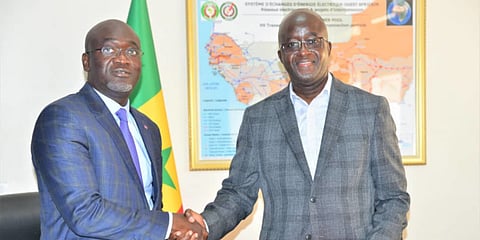Infinity Power Seals 20-year Agreement with Senelec to supply Utility-scale Battery Energy Storage
Infinity Power, a joint venture between Egypt’s Infinity and UAE’s Masdar, announced today the signing of a 20-year Capacity Change Agreement with Senelec, Senegal’s national electricity company to supply 40MW through a battery energy storage system (BESS).
The system will enable Senelec to stabilise the nation’s electricity grid and pave the way for further renewable energy growth in Senegal.
The project will be operated by Infinity Power’s Parc Eolien Taiba N’Diaye (PETN) windfarm, located approximately 70km north of Dakar.
The windfarm supplies 158.7MW of clean, renewable wind energy to over 2 million people across Senegal. PETN represents a 15% uplift in Senegal’s renewable generation capacity, and is the largest wind farm in West Africa.
Construction of the battery energy storage system is expected to commence in early 2024 at the Tobène substation in Thies and is expected to become operational in 2025.
Once complete, it will be one of the largest of its kind in West Africa, and will help Senegal to avoid approximately 37,000 tonnes of carbon dioxide emissions each year. The BESS will also provide ancillary services such as frequency regulation, reactive power support, and energy charge and discharge.
With this project, Infinity Power aims to further its commitment to empowering a future of sustainable, renewable energy across Africa.
The BESS will support Senelec in reducing its dependence on reserve capacity derived from thermal plants, with Senelec estimating that the BESS will save the grid an estimated $165 million over its operating life.
Mohamed Ismail Mansour, Chairman of Infinity Power said: "The capacity charge agreement we have signed with Senelec marks a significant milestone on our roadmap towards providing clean, reliable and affordable electricity access to the communities and citizens of Senegal.
"Battery storage offers incredible opportunities for Senegal to reap the benefits of renewables, while ensuring people get a secure, reliable supply of energy. We are excited to begin a promising new chapter in Senegal and further strengthen our work in the renewable energy sector."
Nayer Fouad, CEO of Infinity Power added: "Providing renewable energy isn’t just about improving capacity, but also the infrastructure around it. We’re looking forward to starting construction on this battery storage project in Senegal, expanding on our existing Parc Eolien Taiba N’Diaye wind farm, and helping to reduce the reliance on fossil fuels.
"Our ambition is to have projects in every country in Africa, and we can’t wait to see what technology we can explore to help deliver clean energy to even more people."
Commenting on the project agreement, Papa Mademba Biteye, General Manager at Senelec said: "Senegal is constantly eyeing opportunities to push ahead its renewable energy agenda by embarking on solutions that speeds up its transition to a low-carbon economy.
"The capacity charge agreement project with Infinity Power plays a pivotal role across both operational and financial levels through a long-term guaranteed performance to provide increased grid stability, integrate renewable energy into Senelec’s electricity grid and empower Senegal in becoming an independent power producer."
The BESS facility project previously received a grant from the United States Trade and Development Agency (USTDA) to fund initial feasibility studies at the site and the analysis necessary to implement and operate the battery storage system.
On the other hand, Parc Eolien Taiba N’Diaye has initiated negotiations with engineering, procurement and construction (EPC) firms and project finance lenders to plan and outline requirements for the technical side of the project.
Infinity Power, the largest renewable energy company in Africa, is targeting 10GW of operational renewable energy by 2030, which will equate to US$5 billion investment.
This target will have the capability to provide electricity to 12 million homes across the African continent by the end of this decade and would contribute a further reduction of approximately 15 to 20 million tons of carbon dioxide emissions per year.


